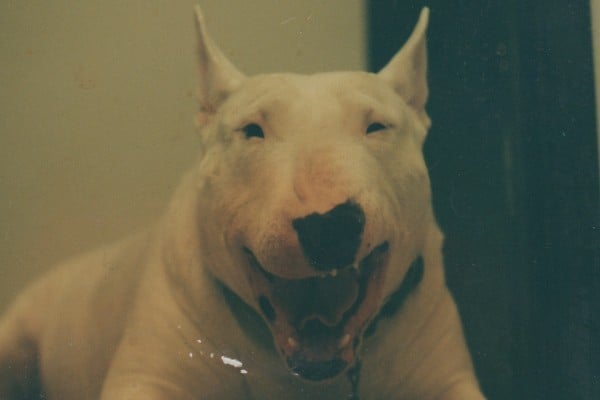Listen to that,” says Cristy Willett, interrupting herself.
I can’t hear anything. Just the sound of the wind in the trees on Willett’s property, just south of the Carcross Cutoff.
“That’s the point,” says Willett. “That’s the sound of 30 dogs when they are happy; they don’t make noise.”
Willett runs the newest dog sanctuary in the Yukon – and the only one run by a private individual. It’s a dog shelter with a very specific purpose and goal; to rehabilitate and care for racing dogs – working dogs, as she calls them.
Willett is a woman with a mission. A retired competitive musher and former head of the Mae Bachur animal shelter, she got the idea of a shelter for racing dogs last January.
“The spark really came when those 100 racing dogs were put down in Whistler, BC,” she says. “People said that mushing dogs were not adoptable, they don’t make good pets. That’s not true.
“Some would gladly put a wear spot on your couch, chew your shoes, and just enjoy your company.”
So Willett and her partner opened the Sled Dog Rescue Sanctuary in June. Right now about 30 dogs are housed in pairs in pens. Her own team forms the core of the pack, with new animals coming in regularly.
She takes in the husky-shepherd crosses when the animals are in distress.
“This isn’t a place for mushers to drop off their unwanted dogs,” she says. “This is for when a musher has a heart attack, or runs into financial problems, or is found to be unable or unwilling to take care of their dogs.”
The dogs that find their way to Willett’s – there are some from the NWT and a pair from Grand Prairie, AB, where forest fires destroyed a musher’s facility – aren’t adoption-ready. They are damaged goods.
There are trust issues, a history of abuse, or even neglect cases that almost killed the animals.
Willett and her team work with the animals, nursing them back to health, slowly re-socializing them so they can be around, and love, humans again.
“The vet provides the physical care,” she says. “We provide the emotional and psychological supports, you might say. It’s a holistic approach to care for the animals.”
It can be a slow process. Some will never leave her sanctuary, she admits.
Willett uses alternative treatments, like the Tellington Touch and herbal medicines, to nurse the animals back to physical and mental health.
She also draws from her own experience to try to reach out to the dogs.
“It’s hard to explain, but I can put myself in their shoes,” she says.
“I have had enough done to me in my life, so when it comes to trust issues with the dog, I remember ‘how would I feel in their situation, what did it take for me to trust again, what did I have to do?’
“I know it seems weird.”
Weird or not, Willett’s approach seems to work. She never raises a hand to the dogs, preferring to use her voice to control, cajole, and encourage the dogs to respect each other and people.
Exercise, fresh air, and human contact are key to rehabilitating working dogs, she says.
“When I was running Mae Bachur, I would try to get mushing dogs fostered out as quickly as possible,” she says. “When they are confined in cages with other dogs, they get stressed. It compromises their immune systems.
“I saw how many dogs needed specific care. If it was a shy dog, or an aggressive dog, it was because it was afraid, or felt threatened. We didn’t have the time or manpower there to give the dog specific training it needed.”
Willett’s sanctuary tries to provide that special care for each animal. They spend a bit of time every day with Willett, just ‘hanging around’ with her, she says. She gets to know them well.
“I keep a personal journal for each dog and write out its history of care, its behaviours, its possible triggers,” she says. “So you get a whole history when you come to adopt a dog.”
Running a dog sanctuary isn’t easy – and it’s expensive. Willett and her partner have sunk at least $15,000 into the shelter so far, and need far more to continue to operate.
People are encouraged to visit her website, http://www.sleddogrescuesanctuary.weebly.com to find out how to support the facility.
“We would even accept bags of Old Roy dog food. That would help,” she says.
Willett has no dogs ready for adoption yet; the shelter has only been open a short while, and the animals aren’t ready. Even when she deems one ready for adoption, there are a few rules for potential new owners.
“We want people to spend at least 12 hours with every animal before they take them home,” she says. “We want them to hang out with the dogs, let them play together, form a real bond first.
“We want to make sure it is a 100 percent successful match.”
While we talk, Lady, a five-month old puppy found near-dead in a ditch in Whitehorse in March, is playing with Willett’s daughter Clara, chasing bubbles. Every once in a while the pup curls up quietly at my feet.
“See that?,” says Willett. “When we picked her up she was in such shock she just crawled in behind Clara’s back in the car and shook. Now she’s playing, or just sitting with us.”
“These dogs don’t need to die unnecessarily because people think they are highstrung or vicious.”




